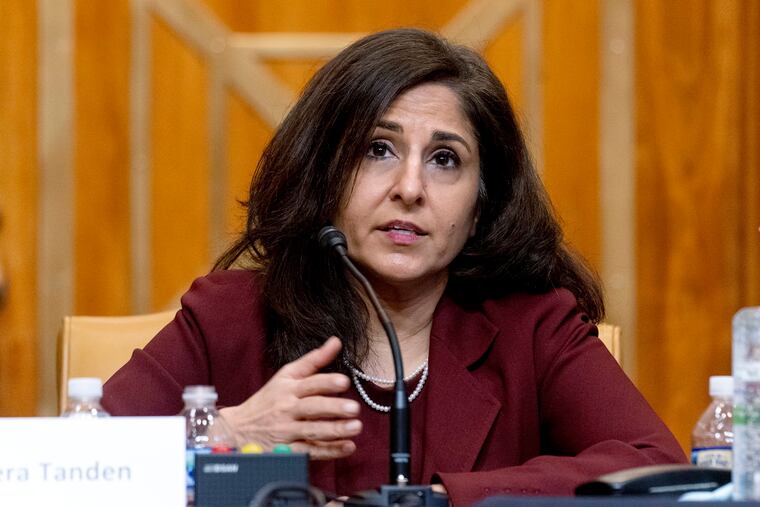Add tweeting while female to the ever-growing double standards applied to women | Helen Ubiñas
Who cares that a white man was able to build a presidential campaign, a presidency and an insurrection with tweets that make anything Tanden tweeted sound downright, well, presidential. She was… mean!

In a familiar rollout of Beltway absurdity, Neera Tanden was forced, during Women’s History Month, to withdraw her nomination as President Biden’s budget chief because of mean tweets.
Tanden, who would have been the first woman of color to lead the Office of Management and Budget, was slammed because of pointed and partisan past social media posts she wrote about lawmakers.
In a letter to the president withdrawing herself from consideration, she said:
“It now seems clear that there is no path forward to gain confirmation, and I do not want continued consideration of my nomination to be a distraction from your other priorities.”
What some might call a distraction, I call the dawning of yet another double standard for women.
Just add it to the ever-growing list:
Speaking while female. Sure, talk if you must, but only if you’re not too loud or too much, and leave plenty of time for manterruptions and mansplaining.
Leading while female. Don’t do it too aggressively or ambitiously, unless of course the place has imploded. Then by all means bring in a woman, especially of color, to clean up the mess.
And the mother of all double standards: parenting while female, as mothers are expected to juggle work and parenting and (waving wildly) everything else, without skipping a beat, at the same time we would never hold such impossible standards for men.
Now there’s tweeting while female.
Who cares that a white man was able to fuel a presidential campaign, a presidency, and an insurrection with tweets that make anything Tanden tweeted sound downright, well, presidential.
She was … mean! (Might I add, to Republicans, to progressives, including, gasp, Sen. Bernie Sanders, and just about anyone else who irked her.)
In what I will concede is a wild understatement, Twitter has a lot of issues — not least among them the harassment of women.
But on its better days, it has served as an equalizer, a space where women, particularly of color, have sowed community and change. Moments and movements were created and grown by women on Twitter. (#MeToo, #BlackLivesMatter, #OscarsSoWhite, but also many other issues without hashtags.)
After the trauma of a Trump Twitter presidency, many are weighing the benefits and pitfalls of the time-, and often soul-sucking, site.
Tanden expressed regrets over her tweets, many of which she deleted before the confirmation hearing.
At one point she suggested she should tweet less, something we should all probably do.
But I can tell you that there are issues I’ve raised (and for which I’ve fought for and against) for years — newsroom equity, protection from online harassment — that weren’t taken nearly as seriously until I routinely began tweeting about them, and other people, mostly women, mostly of color, amplified them with their own experiences and stories.
Even if the people physically around you are choosing not to hear you or see you or value you, there is something comforting and empowering — and yes, maybe a little addictive — about feeling as if you’re not alone, that somewhere out there others are also fighting the good fight.
Some, clearly, at a bigger cost than others.
Tanden, who helped found the Center for American Progress and has held senior advisory positions in Democratic politics since the Clinton administration, will likely get another position in Biden’s administration. But regardless of your feelings about her and her tweeting style, the fact is she felt forced to walk away from a job that should have been hers.
It’s not a perfect parallel, but it reminded me of the time I made the mistake of hastily responding to a reader’s nasty email.
In my defense, it had been a long day and I was on a bus ride back from D.C. after covering the Women’s March on Washington in 2017. I checked the comments beneath one of my columns only to see that many hours earlier, someone had posted my home address. (The Inquirer has since removed comments from most of its stories.)
As I scrambled to alert someone at the paper to take it down, a male reader decided to choose that moment to send some you-have-no-business-being-a-columnist-you-dummy-go-back-to-where-you-came-from snark.
I responded in kind, and while it’s been a few years and some of the details are now fuzzy, I remember walking away from conversations with my bosses feeling that no matter what nonsense or threats filled my inboxes, it probably wasn’t a good career move to take on readers who believed that trolling was an added perk (who needs a coffee mug or a tote!) of subscribing.
Sense a theme?
Already, there have been plenty of pieces and pundits framing Tanden’s doomed nomination as a cautionary tale with an easy fix: Just get off Twitter.
That’s hard to argue against. Less social media would probably be good not only for our own health but the health of this country.
And yet that oversimplification diminishes and dismisses the bigger problem: the ever-growing list of double standards for women.
While women and particularly women of color can make their voices heard better than in earlier eras, it also comes with the inequitable risk that they will be punished for daring to not be silent.